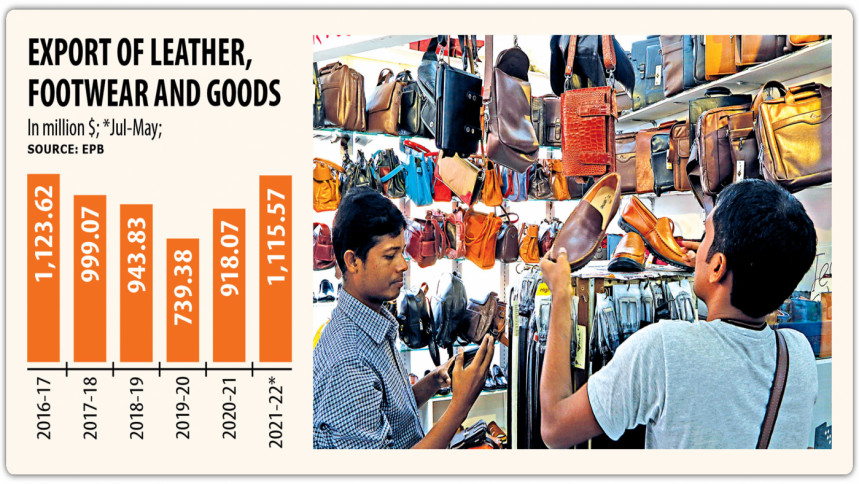
Shipment, however, slows in May
Exporters in Bangladesh raked in more than $1 billion in the shipment of leather, leather goods and footwear in the first 11 months of the current fiscal year despite a slowdown in May owing to supply chain disruptions and the fallout of the Russia-Ukraine war, official figures showed.
The country received $1.16 billion from exports of leather, leather goods and footwear between July and May, already the highest in the last five years, according to the Export Promotion Bureau (EPB).
The higher exports came despite the slowdown in the exports of leather and leather goods last month.
Between July and April, the shipment of leather and leather goods had registered year-on-year growth of 36.93 per cent and 34.51 per cent respectively.
The shipment from both sectors slowed to 28.56 per cent and 34.03 per cent respectively in May. Overseas sales of leather footwear, however, grew from 31.46 per cent in the July-April period to 31.59 per cent in the July-May period.
Exporters say higher living costs in the UK, the European Union and other parts of the world are behind the lower demand for leather goods as customers prefer spending on essential commodities in the face of rising inflation.
Syed Nasim Manzur, managing director of Apex Footwear, said it is not clear how long the present situation would last as it remains uncertain when the Russia-Ukraine war might end.
“It is an unpredictable subject. There will be implications if the crisis continues for long. But if it is short-lived, the situation will be different,” he added.
Manzur, also the president of the Leather goods and Footwear Manufacturers and Exporters Association of Bangladesh (LFMEAB), went on to say that it is very difficult to make predictions.

“Our job now is to watch and see,” he said.
Considering the fact that higher prices mean nothing if export volumes drop, Manzur said manufacturers should aim to reduce the cost of doing business so that they can stay competitive in the global market.
Ziaur Rahman, managing director of Bay Footwear, said that judging by their results in the fourth quarter of the ongoing fiscal, the company projects a 10 per cent drop in overseas orders in 2023.
“So, if we can’t maintain our costs, we will lose our competitiveness in the international market,” he added.
Shakawat Ullah, general secretary of the Bangladesh Tanners Association, said the Russia-Ukraine crisis has impacted the export of leather and leather goods.
“But we can overcome the problem no matter what,” he added.
Leather and leather goods shipments amounted to $111.55 million in the last 11 months of the current fiscal year, when the country’s total export receipts added up to $846 million.
Ullah said manufacturers worked hard during the pandemic to explore new markets and protect their factories and employees, leading to the discovery of non-traditional markets such as Russia and Morocco.
Leather goods are one of the top three highest export earning sectors for Bangladesh.
There are about 60 local firms, including Apex Footwear, Jennys Shoes and Bay Footwear, that export various leather goods mainly to Japan, the EU and to some extent, the US.















